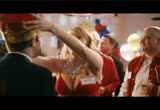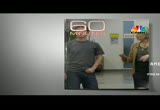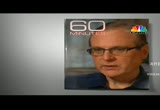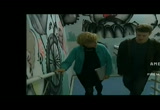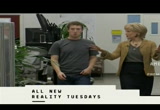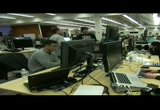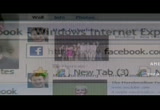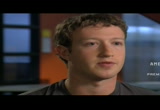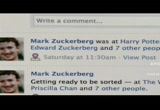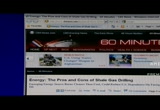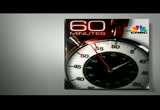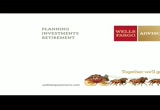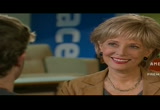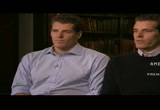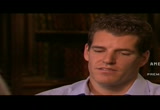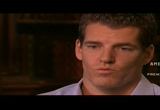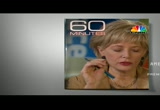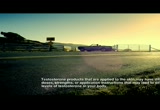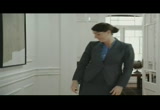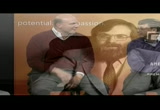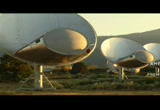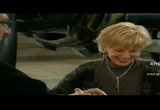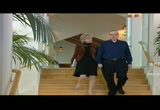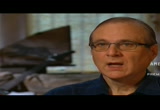tv 60 Minutes on CNBC CNBC April 21, 2013 8:00pm-9:00pm EDT
8:00 pm
[ticking] >> in a nondescript t-shirt at a nondescript desk, mark zuckerberg runs a vast global empire, leading the whole internet in his direction. is the goal for you to conquer the whole internet? to own the internet? >> well, think about it like this. people--if they can use a product of any category--photos, music, tv, anything--either by themselves or with their friends... >> mm-hmm. >> i think most of the time, people want to do those things with their friends, so-- >> so is the answer "yes"? [ticking] you describe bill gates in very harsh terms. um, you've described him as
8:01 pm
being quite abusive. i mean, it's not a pretty picture. >> and i felt like when i wrote it, i should just tell it like it happened, in an unvarnished way, warts and all. >> you'll hear how the two high school buddies who started microsoft and a computer revolution had some pretty trying times along the way. do you think he came to think that you weren't working as hard as he was and it became a source of resentment with him? >> well, i think he was always pushing people to work as hard as they possibly could. >> you included. >> um, maybe me more than everybody else. >> you talk about his yelling--screaming. >> uh, there was a lot of yelling. >> you guys never understood! you never understood the first thing about this. i mean, there's no way. >> we'll figure it out. >> welcome to 60 minutes on cnbc. i'm steve kroft. in this edition, we meet two silicon valley billionaires a generation apart who revolutionized the world of
8:02 pm
computing and the internet. facebook ceo mark zuckerberg and paul allen, microsoft's cofounder. we begin with mark zuckerberg and facebook. if you have a facebook account, you've probably reconnected with an old pal, shared photos with your family, and gotten advice from your friends on what to buy and what to read. but facebook has bigger plans. it wants to turn the entire web into one big social network. lesley stahl first talked with mark zuckerberg in 2008, and three years later, we sat down with mark again. he gave us a preview of his site's new profile page, a change that would affect the 500 million people who were then using facebook, an idea that zuckerberg had cooked up in his dorm room at harvard. >> when you first thought about this--19 years old--is this what you had in mind? did you see this far into the future, or is it way beyond what you dreamed? >> well, it's funny. i mean, when i was getting
8:03 pm
started, you know, with my roommates in college, you never think that you could build this company or anything like that, right? because, i mean--it just--and we were college students, right? >> yeah. >> i mean, we were just building stuff because we thought it was cool. i do remember having these specific conversations with my friends where we thought, "you know, someone is gonna build this. someone is gonna build something that makes it so that people can stay connected with their friends and their family," but no way would we be the ones who were contributing to kind of leading the whole internet in this direction. >> but that's what he's doing: leading the whole internet in his direction. in a nondescript t-shirt at a nondescript desk, mark zuckerberg runs a vast global empire with the world's largest population after china and india. i first met him in 2008 at facebook's old graffitied building in downtown palo alto. the company has since decamped to giant hangars nearby to accommodate their explosive growth. the graffiti is largely gone,
8:04 pm
except for one word you just can't miss. i see "hack" everywhere. >> mm-hmm. >> hack. it has a negative connotation, doesn't it? >> when we say "hacker," there's this whole definition that engineers have for themselves, where it's very much a compliment when you call someone a hacker, where "to hack something" means to build something very quickly, right? in one night, you can sit down and you could churn out a lot of code, and at the end, you have a product. >> which is what he expects from his 500 engineers. as we walked through, we got a sense of high-level competition, whether it's writing code into the night or taking breaks to play speed chess. it's a constant game of one-upsmanship. you have hack-athons. >> yeah, and hack-athons are these things where just all of the facebook engineers get together and stay up all night building things. and we just have this culture-- >> and you too. >> i do too, and, i mean, usually at these hack-athons, i code too just alongside
8:05 pm
everyone. >> as he spoke, i remembered his awkwardness from 2008 and how he rarely blinks. but he's far more relaxed now, easier to smile, and noticeably more confident as he tells you about all the new products they keep launching. you're showing us something that no one else has seen yet. >> soon. >> the company will launch a new layout for the heart of the site, every user's profile page. for example, this is mark's old page filled with scrapbook-like entries in no order of importance, like: "andy samberg plays me on saturday night live." you have to dig around to get any real sense of who mark is as a person. this is mark's new page, which is, in effect, the mark zuckerberg story, or how he wants his friends to see him. his bio information is right up top, with the kind of details he'd tell you if you met him, say, at a bar.
8:06 pm
>> i work at facebook, and i spend all of my time there, right? i mean, here are my friends. um, i grew up in new york, and now i live in california, right? those are really kind of basic, important things. >> under the bio: his latest photos, posted by him or his friends. it's like a running ticker tape of his life. every day, a staggering 100 million photos are uploaded onto the site. lots of photos on the-- right away. >> people love photos. >> yeah. >> photos originally weren't that big of a part of the idea for facebook, but we just found that people really liked them, so we built out this functionality. >> a dozen engineers and designers worked on the new page in this war room... >> cool. >> empty plates and toothpaste tubes by their keyboards. they raced against a clock right there telling them how much time was left to complete each high-priority task. >> we want it to be awesome. >> they came up with a new section on the left. you can now list the important people in your life--mom, dad, sister, sister, sister,
8:07 pm
girlfriend. another new feature pulls up a history of your relationship with any of your facebook friends. >> you can see all of the things that you have in common with that person. and it's just like, it gives you this amazing connection with that person in a way that the current version of the profile that we have today just doesn't do. >> for the over-sharers among us, you'll still get the news. mark just ate an extremely spicy pepper and went to the harry potter amusement park with his dad. there's lots more graphics under "what's important to you?" mark likes lady gaga and epic movies. and finally, there's a sports section. he plays tennis and likes the yankees. but whenever facebook introduces something new, there are always questions about how it protects our personal data. >> sure. >> there's a sense that you, after all this time, aren't always above board and that there's some hidden motive to
8:08 pm
kind of invade our privacy, take the information, and use it to make money. >> we never sell your information. advertisers who are using the site never get access to your information. >> but the new layout does encourage us to reveal more about ourselves on facebook. the company also introduced a new button where users can tell facebook what they like on over 100,000 sites, whether it's a new pair of jeans or a 60 minutes story. so the company does compile and control an ever-growing inventory of your likes and interests. and if facebook itself doesn't sell the information to advertisers, applications, or apps, that run on facebook by outside companies have been known to. >> it's against all of our policies for an application to ever share information with their advertisers. >> but they do. they do. >> and then we shut them down if they do. [ticking] >> coming up: mark zuckerberg on
8:09 pm
facebook and privacy. >> it's something that we take really seriously. and, you know, every day, we come to work and just try to do a good job on this. >> and yet, you've got the ftc looking into it. you have members of congress looking into it. there have been--privacy groups have lodged formal complaints. you've hired a lobbyist in washington to deal with this, so you know it's a problem. >> that's ahead when 60 minutes on cnbc returns. [ticking]
8:12 pm
[ticking] >> when it comes to the issue of privacy on the internet, facebook is sometimes distrusted even by its most ardent users. facebook ceo mark zuckerberg told us that they don't sell their users' information to advertisers, but do people on facebook really have control over their personal information? >> am i a fuddy-duddy... >> yes. >> by... [both laugh]
8:13 pm
am i a fuddy-duddy by asking all these privacy questions? >> no. >> kara swisher is the editor of all things digital, a website about high tech in silicon valley. you know, i wonder if facebook can exist if it doesn't invade privacy. >> that's right. that's exactly right. >> so it needs to invade privacy. the issue is transparency, isn't it? >> kind of, yes. >> how up front they are with the users. >> that is, i think, mark's one weakness, and i think that was why he got so nervous in the interview we did. >> okay, you want to take off the hoodie? >> she's referring to this conference where she grilled mark on privacy in an interview she calls a "sweat-o-palooza." >> whoa. >> he had, like, flop sweat, and it was really quite disturbing, actually, to watch. >> she was pushing him to admit that facebook is misleading about its privacy policies-- an issue that comes up time and time again. >> now, do we get it right all the time? no! but it's something that we take really seriously, and, you know, every day we come to work and just try to do a good job on this. and yet, you've got the ftc looking into it.
8:14 pm
you have members of congress looking into it. there have been--privacy groups have lodged formal complaints. you've hired a lobbyist in washington to deal with this, so you know it's a problem. >> well, i think that this-- it's a really important thing for everyone to just be thinking about. >> it's huge. >> i mean, privacy and making sure that people have control over their information is, i think, one of the most fundamental things on the internet. >> it's become even more important as facebook introduces one new product after the next. >> these are all just, like, engineering teams. these guys work on the platform. >> chris cox is head of product development. he sits across the desk from mark and thinks about "what next?" for facebook... >> this is how close we sit. >> and increasingly, he's thinking outside your desktop. how many people actually access facebook through their mobile devices? >> i think the latest number is over 200 million. >> so in other words, that's obviously the future. >> i think it's a huge part of the future. >> is facebook developing a
8:15 pm
phone device, like apple did iphone? >> no. we're working on building software that can be used on all phones. >> their latest product is messages, which combines email, cell phone texting, and instant messages into one. they call it the ultimate switchboard. so do you think email will become obsolete? no. >> i'm not sure. but what we've found is that more people are using messages-- are moving away from email. and so if we build a really compelling experience, i think people are going to switch over. but i'm not going to call the end of anything. >> was this directed at gmail? >> no. >> google's email? >> no. >> because everybody's talking about a gmail killer. >> it's certainly what everyone's writing about. >> google... >> yes. >> facebook and google. >> yes. >> are they on a collision course? >> they are indeed. >> the fight's over what? it's over how-- >> search. how people find, discovery, search. >> say you want to buy a car. you can type "prius" on google and get publicly available information.
8:16 pm
or you can type "prius" on facebook and get personal advice about it from your friends. are you trying to turn everything we do on the web into a social function? >> i think what we've found is that when you can use products with your friends and your family and the people you care about, they tend to be more engaging. i think that we're really gonna see this huge shift where a lot of industry is--and products are just gonna get remade to be social. >> so you're out here in silicon valley. can you feel a tectonic plates... >> yes. >> shifting over? >> well you can see the talent shift over... >> right. >> you know, there's been a big war about talent and payments, millions of dollars to keep people, engineers at google. >> mark's number two, sheryl sandberg, defected from google. he recently wooed over the inventor of google maps, and he even poached google's cafeteria chef. there's kind of a talent brain drain from them to you, something like 200 people who work for you, 10%...
8:17 pm
>> i do think it's clear... >> are former googlers, right? >> there are areas where the companies compete. but then there are all these things where we just don't compete at all. >> is the goal for you to conquer the whole internet? to own the internet? >> well, think about it like this: people--if they can use a product of any category-- photos, groups, music, tv, anything--either by themselves or with their friends, i think most of the time, people want to do those things with their friends. >> so is the answer yes? [laughs] come on. >> the answer is that we want to help other people build a lot of these products. >> he doesn't like to talk about competing with google, just as he didn't in 2008 when i compared him to its founders larry and sergey. you seem to be replacing larry and sergey as the people out here who everyone's talking about. you're just staring at me. >> is that a question? >> that line is now in the social network, the movie about facebook. >> is that a question?
8:18 pm
>> the question is, who is the real mark zuckerberg, and how did facebook really get its start? >> why didn't you raise any of these concerns before? >> we'll look back at the controversial creation of facebook and its cofounder, mark zuckerberg, when we return. [ticking] >> when we approached him, we had been working on the idea for almost a year, at that point. we had a sophisticated codebase. it wasn't an idea scribbled on a napkin. it was a very sort of mature idea, and we brought him on to bring it to completion. >> we agreed to work on this project. he sabotaged our project, and he betrayed us. >> okay, big question: are you guys on facebook? >> yes. >> we are. >> get out of here. >> when 60 minutes on cnbc returns. [ticking] acceler-rental.
8:19 pm
at a hertz expressrent kiosk, you can rent a car without a reservation... and without a line. now that's a fast car. it's just another way you'll be traveling at the speed of hertz. good afternoon. chase sapphire. (push button tone) this is stacy from springfield. oh whoa. hello? yes. i didn't realize i'd be talking to an actual person. you don't need to press "0," i'm here. reach a person, not a prompt whenever you call chase sapphire. why should saturday night have all the fun? get two times the points on dining in restaurants, with chase sapphire preferred. ♪ here we are, me and you ♪ on the road
8:20 pm
♪ and we know that it goes on and on ♪ [ female announcer ] you're the boss of your life. in charge of making memories and keeping promises. ask your financial professional how lincoln financial can help you take charge of your future. ♪ ♪ oh, oh, all the way ♪ oh, oh ♪ oh, oh, all the way welcnew york state, where cutting taxes for families and businesses is our business. we've reduced taxes and lowered costs to save businesses more than two billion dollars to grow jobs, cut middle class income taxes to the lowest rate in sixty years, and we're creating tax free zones for business startups. the new new york is working creating tens of thousands of new businesses, and we're just getting started. to grow or start your business visit thenewny.com
8:21 pm
this is america. we don't let frequent heartburn come between us and what we love. so if you're one of them people who gets heartburn and then treats day after day... block the acid with prilosec otc and don't get heartburn in the first place! [ male announcer ] one pill each morning. 24 hours. zero heartburn. it's lots of things. all waking up. connecting to the global phenomenon we call the internet of everything. ♪ it's going to be amazing. and exciting. and maybe, most remarkably, not that far away. we're going to wake the world up. and watch, with eyes wide,
8:22 pm
as it gets to work. cisco. tomorrow starts here. [ticking] >> having become a part of so many lives, facebook's creation is now the fodder of myths, the subject of lawsuits, a number of books, and the social network, an award-winning 2010 movie, all focusing on its cofounder and ceo, mark zuckerberg. >> half a billion people give you their personal information. do you feel that, because of that, they have a right to know a lot about you personally, about your values, about what you think? >> yeah, i think that because of that, we have to do a very good job of communicating, as a company, really. >> no, you. i'm talking about you, mark zuckerberg. is it important to know who's running facebook, in light of that? >> yeah, it is. it is. >> interest in what makes mark
8:23 pm
tick has heightened since the release of the movie the social network that depicts him as a callous genius who betrays friends and principles to protect his creation, facebook. >> if you guys were the inventors of facebook, you'd have invented facebook. >> the real mark vowed he would never see the film. on opening day, he changed his mind. >> we took the whole company to go see the movie. >> took the whole company. >> i mean, i actually thought it was pretty fun. >> but i guess my question is, was it hard to watch for you? >> in watching it, it's pretty interesting to see what parts they got right and what parts they got wrong. i think that they got every single t-shirt that they had the mark zuckerberg character wearing right. i think i actually own those t-shirts. >> come on. >> and they got sandals right and all that. >> [laughs] but i mean, there are hugely basic things that they got wrong too. i mean, they made it seem like my whole motivation for building facebook was so i could get girls, right? and they completely left out the fact that my girlfriend and i have been dating since before i started facebook, right?
8:24 pm
so i'm not just, like-- >> wait, what? say that again. the girl--your current girlfriend, you were dating back then during the time of the movie? >> yeah, i've been dating my current girlfriend since before i created facebook. yeah. i mean, and--yeah. >> you know, i've heard two reactions. one is about you very personally, and it's not so flattering. the other is that, "wow, he's a really great entrepreneur." >> i get two reactions too, but they're actually a little bit different from the ones that you said. there's a set of people who, i think, have been following the facebook story who, i think, had a deeper analysis of which things in the movie were true and which ones were false and all that. then the rest of people, i just think were pretty surprised and even amazed that, like, "wow, facebook is an interesting enough thing to make a movie out of," or, "this mark zuckerberg person, i never heard of him. like, this must be interesting." and i can't tell you how many messages i've gotten from people who use facebook writing in to say, "this movie was really inspiring to me. after seeing this movie, i want to start a company," or, "i want
8:25 pm
to go into computer science," or, "i want to study math." and if the movie had that effect on people, then awesome, right? >> [laughs] i mean, that's great. >> you almost sound enthusiastic about this movie. >> um, that. that part. >> that part. >> [laughs] >> got it. that part. [both laugh] >> when you say you had this idea... >> one part he doesn't like has to do with the winklevoss twins, tyler and cameron. >> excuse us for inviting you in. >> in real life, they're olympic rowers who claim that when they were at harvard, they had the idea of a university-based social networking site first, that in 2003, mark agreed to work on their project, but instead, they say, he ripped them off. >> when we approached him, we had been working on the idea for almost a year at that point. we had a sophisticated codebase. it wasn't an idea scribbled on a napkin. it was a very sort of mature idea, and we brought him on to bring it to completion. we agreed to work on this
8:26 pm
project. he sabotaged our project, and he betrayed us. >> there were other social networking sites already there. it isn't as if you had the first idea. right? you admit that? >> that's a typical argument that comes from facebook that social networking existed at the time. >> right. >> we weren't individuals on separate sides of the country developing social networks unbeknownst to each other. we were teammates. we were partners. >> so how did you actually find out that he was working on a different project? >> we found out by reading the harvard student newspaper. >> so that's the first you realized. >> yup. >> what did the article say? >> it said to the effect, "mark zuckerberg launches thefacebook.com." it described a bit about it. we turned to each other, and we said, "isn't that the mark zuckerberg that's working with us on the same project?" >> so they sued, and in 2008,
8:27 pm
the case was settled out of court for a reported $65 million. but the twins have since appealed, arguing that facebook misled them about the value of the stock in the settlement. why are you pounding away at this when you're making so much money? >> this is all about principle. >> well, i have to be honest with you. it doesn't look that way. >> [chuckles] >> it looks like it's all about money. >> no. you will have--i'm not sure anybody can quite put themselves in our shoes and understand what it must've felt like to start an idea in 2002, to approach a fellow student in 2004, to have it stolen, sabotaged, ripped off. >> recently leaked instant messages, reportedly from mark's old computer, suggest he did deliberately delay the twins' project. >> he premeditatedly sandbagged us because he knew getting there
8:28 pm
first was everything. there wasn't room for two social networks at harvard and universities around the country. >> what do you say to people who say, "come on, give the guy a break. he was 19 years old"? >> i know that when i was 19, i wouldn't have behaved that way. i would have, you know, certainly not betrayed fellow classmates. >> okay, big question: are you guys on facebook? >> we are. >> yes. >> get out of here. [ticking] >> coming up: mark zuckerberg and the winklevoss twins. >> i mean, they make it seem like this whole lawsuit is such a huge part of facebook's history. i've probably spent less than two weeks of my time worried about this lawsuit at all, right? >> maybe you should've worried about it a little more. [laughs] >> maybe i should have early on, right? >> do you feel any, any remorse at all about the twins or anything that happened with them? >> i mean, after all this time, i feel bad that they still feel bad about it. >> and later, we meet paul allen, the man who cofounded
8:29 pm
microsoft with bill gates. >> you kept bringing him ideas, and you write in the book, "he was always popping my balloon." >> yeah, that's right. that's right. i mean, i would have ten ideas, and he would kind of pick them apart one by one. >> i mean, there's no way. >> when 60 minutes on cnbc returns. >> you never understood the first thing about this. [ticking] ♪ [ male announcer ] a car that can actually see like a human, using stereoscopic cameras. ♪ and even stop itself if it has to. ♪ the technology may be hard to imagine.
8:30 pm
but why you would want it... is not. the 2014 e-class. it doesn't just see the future. it is the future. how did i know? well, i didn't really. see, i figured low testosterone would decrease my sex drive... but when i started losing energy and became moody... that's when i had an honest conversation with my doctor. we discussed all the symptoms... thengaveme blood tests. showed it was low t. that's it. it was a number -- not just me. [ male announcer ] today, men with low t have androgel 1.62% (testosterone gel). the #1 prescribed topical testosterone replacement therapy, increases testosterone when used daily. women and children should avoid contact with application sites. discontinue androgel and call your doctor if you see unexpected signs of early puberty in a child, or signs in a woman, which may include changes in body hair or a large increase in acne, possibly due to accidental exposure. men with breast cancer
8:31 pm
or who have or might have prostate cancer, and women who are or may become pregnant or are breastfeeding, should not use androgel. serious side effects include worsening of an enlarged prostate, possible increased risk of prostate cancer, lower sperm count, swelling of ankles, feet, or body, enlarged or painful breasts, problems breathing during sleep, and blood clots in the legs. tell your doctor about your medical conditions and medications, especially insulin, corticosteroids, or medicines to decrease blood clotting. so...what do men do when a number's too low? turn it up! [ male announcer ] in a clinical study, over 80% of treated men had their t levels restored to normal. talk to your doctor about all your symptoms. get the blood tests. change your number. turn it up. androgel 1.62%. get the blood tests. change your number. turn it up. tired, achy feet we've got your number. i stepped on the machine, and it showed me the pressure points on my feet and exactly where i needed more support. then, i got my number. i tried the free dr.scholl's foot mapping center. in two minutes, i got my foot map and custom number. just step on, and over 2000 sensors measure your foot length, arch type and pressure points
8:32 pm
to create your own personal foot map. go to drscholls.com/footmap or text feet to 467467 to find a foot mapping center near you. my number is 330, and i found my dr.scholl's custom fit orthotic inserts right there on the machine. they had just the cushioning and support i need. each insert is designed with three layers to add custom comfort, cushion your pressure points and support your arches. and there's a money-back guarantee. i am a believer. i'm a believer! i'm a believer. find a free foot mapping center near you now. go to drscholls.com/footmap or text feet to 467467 and learn how to save $10 on your orthotics. because life starts with your feet. [ticking] >> the winklevoss twins, tyler and cameron, told us that when they were at harvard with mark zuckerberg, they had the idea of a university-based social networking site first. they said that mark agreed to
8:33 pm
work on their project, but instead, ripped them off. >> let me ask you about the winklevoss twins. they sued. you settled. >> mm-hmm. >> they're still coming after you. >> you know, it's hard for me to fully wrap my head around where they're coming from on this. you know, early on, they had an idea that was completely separate from facebook. and that, i mean, it was a dating site for harvard. and i agreed to help them out with it--to help them, right? i mean, it wasn't a job. they weren't paying me. i wasn't hired by them or anything like that. and then, the idea that i would then go work on something completely different, like facebook, and that they would be upset about this all these years later is kinda mind-boggling for me. now, i mean, this is another thing that i think the movie really missed is, i mean, they make it seem like this whole lawsuit is such a huge part of facebook's history. i've probably spent less than
8:34 pm
two weeks of my time worried about this lawsuit at all, right? >> maybe you should've worried about it a little more. [laughs] >> maybe i should have early on, right? but i guess the point that i'm trying to make is, this has never been a big deal to facebook or its evolution. >> do you feel any, any remorse at all about the twins or anything that happened with them? >> i mean, after all this time, i feel bad that they still feel bad about it. >> kara swisher, editor of a website about high tech, says she doesn't feel sorry for the twins. >> i'm sorry, they got paid $65 million for one medium idea that they never could've made into anything. >> well, you sound very sympathetic to mark as an individual, to me. >> in this case, yes, 'cause he is the entrepreneur. i think he definitely tried to screw with the winklevoss. that's clear. he promised to do a service for them he didn't do. he did. but he also did build the business without their help.
8:35 pm
>> you are famous for coining the term "toddler ceo"... >> i am. >> about mark zuckerberg. >> i did. >> you told us that you thought he was inexperienced. >> he's done a great job. he's a prodigy. the toddler's a prodigy, as it turns out. >> they were calling you the toddler ceo, and they don't say that any more at all. this is a tough question, but try. >> mm-hmm. >> how would you grade yourself as a ceo, as the leader of this business? >> i mean, that is a hard question. >> that's a hard question. >> i also don't think you can ever win by answering that question. [laughs] now, we've made a huge number of mistakes along the way, right? now i always say i just think we've made probably every possible mistake you could make. >> is there a decision that you've made that the people around you told you was a mistake and you defied them, and you were right? >> you know, the most famous one, i think, probably has to do with selling the company, right? i mean, in 2006... >> right. >> we had this opportunity to
8:36 pm
sell the company to yahoo for a billion dollars, and we turned that down. i think a lot of people at the time thought we should sell the company. >> absolutely. >> but you know, i felt really strongly, and i think now, people generally think that that was a good decision. >> since that decision, the company has grown considerably. are you ever going to have the ipo? ever? >> you know, maybe. >> it's like you can't let go. >> you can't let go? >> you can't let go. >> i don't think it's letting go. here's wayink about it: a lot of people who i think build start-ups or companies think that selling the company or going public is this end point, right? it's like, you win when you go public. and that's just not how i see it. >> you're 26 years old. >> i know. >> [laughing] you feel old? >> yeah. >> [laughs] >> yeah. running this giant company. your personal worth is said to be $6.9 billion. [gasps] do you ever just pinch yourself? do you ever just say, "wow, this
8:37 pm
happened to me"? >> i mean, it is pretty crazy. >> and mark zuckerberg may even get richer. when facebook eventually goes public, it's market value could be more than $100 billion. in april of 2011, the winklevoss twins lost their appeal of the lawsuit against zuckerberg, and their 2008 settlement still stands. [ticking] [bluesy guitar music] ♪ coming up, we meet another silicon valley billionaire: microsoft's paul allen. >> you built this building. >> it's amazing to think, back then, nobody had personal computers. i mean, there were computers in universities and research labs and in corporations, but nobody had personal computers. [keys clacking] >> the cofounder, when 60 minutes on cnbc returns. [ticking] [ female announcer ] the only patch for the treatment
8:39 pm
is exelon patch. now with more treatment options, exelon patch may improve overall function and cognition. your loved one can get a free 30-day trial. and you can have access to nurses. it does not change how the disease progresses. hospitalization, and rarely death, have been reported from wearing more than one patch at a time. the most common side effects are nausea, vomiting, diarrhea, fall, loss of appetite or weight, application site redness, and urinary tract infection. the likelihood and severity of these side effects may increase as the dose increases or if patients weigh less than 110 pounds. people at risk for stomach ulcers who take certain other medicines should talk to their doctor as serious stomach problems such as bleeding may worsen. patients may experience slow heart rate. free trial offer for them. nurses to talk to for you. visit exelonpatchoffer.com. ♪ man: how did i get here? dumb luck? or good decisions?
8:40 pm
ones i've made. ones we've all made. about marriage. children. money. about tomorrow. here's to good decisions. who matters most to you says the most about you. at massmutual we're owned by our policyowners, and they matter most to us. ready to plan for your family's future? we'll help you get there.
8:41 pm
[ticking] >> today paul allen is known more for his mega-yachts and palling around with brad and angelina than for his revolutionary ideas in the early years of microsoft, the company he cofounded with high school buddy bill gates. and as lesley stahl first reported in april 2011, paul allen wrote a memoir called idea man in which he not only gave an account of his ideas, but also drew a dark portrait of his lifelong friend. as allen writes, he was too
8:42 pm
angry and proud to tell bill gates point-blank, "some days, working with you is like being in hell." >> you describe bill gates in very harsh terms. you've described him as being quite abusive. i mean, it's not a pretty picture. >> and i felt like when i wrote it, i should just tell it like it happened, in an unvarnished way, warts and all. >> you know, here he is, doing such great work--he's almost a saint now--and it seems like an odd time to write an unflattering portrait of him. >> the timing had nothing to do with the many wonderful things that bill has done. but the timing was because i wanted to see if i could do it and hopefully be alive to see it published. >> no wonder he was concerned. when he started the book in 2009, he had stage 4 lymphoma. the book goes back to the beginning. this is a picture of allen when he was 15 and met a boy at his
8:43 pm
private school in seattle, two years his junior, named bill gates. >> see, there's the machine room. you can see the machine room in there. >> this video shows the two buddies revisiting an old computer lab where they used to feed their obsession with programming. >> you'd lift me into one of those huge garbage bins. >> bill and i would actually dive in the dumpsters to try to find listings of the secret inner code of the operating system... >> you're kidding. >> and try to figure out how it worked. that's how passionate we were. >> they both became crack coders, but early on, allen emerged as a creative dreamer; gates, a cold-eyed pragmatist. you write that when he was 13 years old, he told you, "one day, we're gonna start a company, run a company." >> he was saying, "well, imagine what it's like to run a fortune 500 company," and i'm thinking, "i have no idea." you know, my parents were librarians. >> you kept bringing him ideas, and you write in the book, "he
8:44 pm
was always popping my balloon." >> yeah, that's right. that's right. i mean, i would have ten ideas. and he would kind of pick them apart, one by one. >> one of allen's ideas gates didn't shoot down would lead to the personal computer revolution and launch microsoft. it was 1974. he was a college dropout working in boston, and one day he spotted a magazine announcing a new small computer called the altair. he ran to show it to his friend gates, then at harvard. >> i said, "here, look at the magazine! this is computer we've been waiting for." >> this is how the pc--the idea that we all have these computers--this is how it started. >> yeah, and it's amazing to think, back then, nobody had personal computers. i mean, there were computers in universities and in research labs and in corporations, but nobody had personal computers. >> allen's idea was to write software that would enable the altair to work as well as those
8:45 pm
large computers. >> and so we called up the company that made it and said, "well, we can demonstrate this software for you very quickly. are you interested?" and they said, "sure, if you can really show up and demonstrate it." >> did you have software? >> no. no. >> you had nothing. >> we had nothing. >> so they spent the next eight weeks at harvard feverishly writing code, but without an altair to test on. allen writes that because gates looked like he was 13, they decided allen should go alone to pitch their software. sitting by an old original altair, he showed me how he fed the computer a paper strip with their code punched into it and typed, "print 2+2." >> and then i hit return to send it, and lo and behold, it printed "4." and a wave of relief surged over me because i couldn't--i almost couldn't believe it had worked the first time. so that night, i call bill up and i say, "billy, it's unbelievable; it worked."
8:46 pm
and we were just over the moon. >> it was the beginning of the age of a computer in every home on every desk. almost overnight, people started buying these small computers, and their software was in high demand. in 1977, gates was even interviewed on a tv show. >> there's a lot of people who are forecasting that there'll be software stores just like there are record stores today and that there'll be thousands and thousands of those. and i think i'd have to agree with that. >> allen writes that gates had a rare gift for programming. he was also the shrewder businessman. from the beginning, he demanded a larger share of the company: 60%, and then more. but allen says he was the one who pushed through the company's big early break: developing an operating system for ibm's first personal computer in 1980. yet as the company soared, allen didn't want to give up his whole life to microsoft the way gates did. >> well, i've always had so many
8:47 pm
different interests. >> but do you think he came to think that you weren't working as hard as he was and it became a source of resentment with him? >> well, i think he was always pushing people to work as hard as they possibly could. >> you included. >> maybe me more than everybody else. >> you describe bill in this period--and actually throughout--as tough, a taskmaster. you talk about his yelling--screaming. >> there was a lot of yelling. >> you guys never understood! you never understood the first thing about this. [ticking] [indistinct conversation] >> coming up: paul allen on working with bill gates. [indistinct conversation] >> that's ridiculous. i'm not using this thing. no, no, no, no, no. somebody's confused. somebody's just not thinking. i mean there's no way. >> we'll figure it out. >> you had to fight back intensely to stand your ground and make your position and your convictions expressed.
8:48 pm
>> were you just screaming at each other for hours? >> and that's exhausting. it's exhausting, but that was bill's style. >> you guys never understood! >> when 60 minutes on cnbc returns. [ticking] welcnew york state, where cutting taxes for families and businesses is our business. we've reduced taxes and lowered costs to save businesses more than two billion dollars to grow jobs, cut middle class income taxes to the lowest rate in sixty years, and we're creating tax free zones for business startups. the new new york is working creating tens of thousands of new businesses, and we're just getting started. to grow or start your business
8:50 pm
only hertz gives you a carfirmation. hey, this is challenger. i'll be waiting for you in stall 5. it confirms your reservation and the location your car is in, the moment you land. it's just another way you'll be traveling at the speed of hertz. good afternoon. chase sapphire. (push button tone) this is stacy from springfield. oh whoa. hello? yes. i didn't realize i'd be talking to an actual person. you don't need to press "0," i'm here. reach a person, not a prompt whenever you call chase sapphire. why should saturday night have all the fun? get two times the points on dining in restaurants, with chase sapphire preferred.
8:51 pm
...amelia... neil and buzz: for teaching us that you can't create the future... by clinging to the past. and with that: you're history. instead of looking behind... delta is looking beyond. 80 thousand of us investing billions... in everything from the best experiences below... to the finest comforts above. we're not simply saluting history... we're making it. ♪ roomba, roomba ♪ roomba, roomba ♪ roomba, roomba ♪ roomba, roomba ♪ got a robot vacuum ♪ cleaning up my life ♪ and it's gonna cut through ♪ filth and funk ♪ just like a knife ♪ dirt won't come back again ♪ thanks to ♪ my brand new friend ♪ got a robot vacuum ♪ cleaning up my life
8:52 pm
[ticking] >> a 1994 cbs news profile got a sample of bill gates' management style, which paul allen describes as browbeating and personal verbal attacks. >> that's ridiculous. i'm not using this thing. no, no, no, no, no. somebody's confused. somebody's just not thinking. i mean, there's no way. >> you had to fight back intensely to stand your ground and make your position and your convictions expressed. >> but he didn't like to back down. so these fights would go on, you said. they could go on for hours. >> oh, yeah. that's right. >> were you just screaming at each other for hours? >> and that's exhausting. it's exhausting, but that was bill's style. >> allen was miserable and felt he was being marginalized, and then things got a lot worse; he got cancer. one night, he passed by gates' office and overheard him talking with steve ballmer, who'd been hired to help run the company.
8:53 pm
what were they saying? >> they were basically talking about how they were planning to dilute my share down to almost nothing. and it was a really shocking and disheartening moment for me. >> and you were sick. >> i think i was still probably in the middle of radiation therapy. >> he burst in and interrupted them. he says they were trying to cut him out and rip him off. >> and of course, steve came over to my house later that night to apologize. >> he did? >> he did. >> but bill didn't come. >> no, he sent steve. >> he sent steve. it wasn't steve. he sent steve. >> well... steve's the one who came. >> shortly after, allen left, but he got to hold on to all his shares. it's hard to feel sorry for him. he was 30, cured of cancer, and owned nearly a third of microsoft. so you built this building? >> yeah. >> after the company went public, allen became one of the richest men on earth, at one
8:54 pm
point worth an estimated $40 billion. gates would spend another two decades running microsoft, launching word, windows, and explorer. >> thank you. >> and once he retired, he devoted himself to eradicating global disease and improving education. allen has spent his wealth on a hodgepodge of many interests. for instance, he plays electric guitar, so he has his own personal rock and roll band to jam with. and he bought jimi hendrix's woodstock guitar for $750,000. is it true that you have actually jammed with mick jagger? and bono? >> i've played with mick and bono and peter gabriel and a number of other people. it's amazing. >> he likes science fiction. he subsidizes an antenna farm listening for aliens. an avid reader, he showed us a shakespeare folio he keeps at
8:55 pm
his estate. >> this is my most-prized book, and you can see it was printed in 1623. >> this is kind of a sports center. >> right. >> oh, my god. look at this. this is gigantic. >> yeah. >> wow. look at that. oh, great swimming pool. wow, is that a slide? >> that's a waterslide, and my sister's kids have used it quite a bit. although i've seen many adults enjoy it too. including myself. >> and the chihuly art. you have a lot of his stuff. >> i really love his work. >> you became the owner of the seahawks. he likes football; he bought an nfl team. he likes basketball even more; he also bought an nba team. he's a movie buff, so he invested in dreamworks, the hollywood studio. he wants to travel, so he built himself a yacht longer than a football field equipped with its
8:56 pm
own submarine. he has spent over a billion dollars on philanthropy, including building an institute to study the brain, and like gates, he pledged to give most of his money away to charity. now he got married. >> right. >> you never got married. >> not yet. >> not yet? >> i'm still optimistic. i still believe i'm going to meet somebody and that's gonna happen, but... >> you want to. >> i want to have a family. >> but he's often described as a recluse. something struck me when he showed us his collection of vintage warplanes. i get this howard hughes-y feel with the planes, hollywood. do you think about that ever? >> well, i hope i don't end up in a cinema by myself watching ice station zebra over and over again. i think i've got such a diverse set of interests, movies, aviation, technology--
8:57 pm
>> howard hughes. >> well, i don't know if howard was involved in sports teams. >> allen's diverse set of interests also led him to invest in over 100 business ventures. most of them were poorly managed or ahead of their time, so they flopped, and he slid from being the third-richest man in the world to 57th. were you just too early, or was it that you really needed a bill gates and didn't have that other person to push it through? >> look, in microsoft days, you had some great ideas and some great execution between me and bill and many other people. you know, in technology, most things fail. most companies fail. but i had some whoppers. >> some of his whoppers, however, produced numerous patents. in a move that angered silicon valley, allen sued several giant companies, accusing them of infringing on those old patents. who are you suing? >> oh, it's a long list.
8:58 pm
>> aol, apple, ebay, facebook, google, netflix, office depot, office max--i can--staples, yahoo, and youtube. >> right. >> how do you argue that you had something to do with google? it just seems so outlandish or kind of wacky. >> look, microsoft and google, all these people have patents of their own. they all enforce patents. they all charge other companies for patents, and all i'm trying to do is get back the investment that i made to create these patents. >> we kept hearing that what he's really trying to do is gain recognition as a tech visionary, but with his book idea man, he's being branded a bitter billionaire. what's your reaction to people saying it's kind of a revenge book, a bitter book? >> it's not about that. i just felt like, you know, it's an important piece of technology history, and i should tell it
8:59 pm
like it happened, and i hope people understand and respect that. >> but for all the bad feelings allen writes about with gates, near the end of the book, he reveals something that happened when he got cancer a second time in 2009. and he came to see you. he comforted you when you were sick. >> right. bill came, you know, here to my house multiple times, and we had some great talks, and there's a bond there that can't be denied, and i think we both feel that. >> even after the book. i know he's read the book. >> right. no, i'm sure at some point, we'll sit down and talk about the book, which we haven't done yet-- >> you'll have a screaming match. >> well, i don't know about screaming, but it'll be-- i'm sure it'll be a heated discussion. >> do you think there's any reason that you're gonna have to apologize to him now? >> i don't think so. >> we asked bill gates for a comment, and while he declined, he has said that the founding of microsoft was an equal partnersp
106 Views
IN COLLECTIONS
CNBC Television Archive
Television Archive  Television Archive News Search Service
Television Archive News Search Service 
Uploaded by TV Archive on

 Live Music Archive
Live Music Archive Librivox Free Audio
Librivox Free Audio Metropolitan Museum
Metropolitan Museum Cleveland Museum of Art
Cleveland Museum of Art Internet Arcade
Internet Arcade Console Living Room
Console Living Room Books to Borrow
Books to Borrow Open Library
Open Library TV News
TV News Understanding 9/11
Understanding 9/11